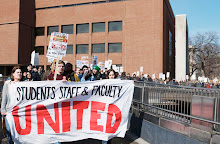Subscribe to:
Post Comments (Atom)
skip to main |
skip to sidebar

Reclaim the University of Minnesota!
RECLAIM THE U!
As the administration has come to dominate instead of to serve the university, intellectual and educational values have been displaced by market ones like "efficiency" and "productivity." Faculty and students have been commensurately marginalized in the governance of the institution. We do not say that the university ought to be inefficient or unproductive, but we do demand that values central to scholarly and scientific inquiry and education be restored to the center of the university's endeavors, including (indeed, especially) the management of its finances. Our efforts have a fivefold focus:
1. Governance. The university should be governed by those who carry out its mission of teaching, research, and public service. At present faculty have little meaningful role in making decisions that are handed down from central administration. This state of affairs results from manifold causes, faculty in generations gone by having ceded governance responsibilities to an ever-growing body of administrators. We the faculty must resume our proper role in making, rather than merely reacting to, the decisions that govern our work and our workplace.
2. Transparency in budgeting. The administration should make all information about the university's finances, including expenditures as well as revenue sources, readily available to the public in comprehensible form. At present it is difficult or even impossible to find out how the university spends most of the funds at its disposal, effectively prohibiting people without privileged access and knowledge from scrutinizing the administration's allocation of financial resources. (N.B.: All these resources are public funds once they enter the land-grant institution's coffers.) We recommend an independent audit to open the university's budget to such scrutiny.
3. Accountability for the administration. Every office within central administration should be required to provide to the public an account of what it does, what relation its work bears to the university's mission, and why it costs what it does.
4. Workload. The administration demands greater "productivity" from faculty and staff at the same time that it reduces the resources we need to produce anything and increases the burdens that hamper our work. If resources are withdrawn, our workload must be reduced, not increased. We do not want to do less teaching or less research, rather, we demand that unfunded mandates handed down by the administration be eliminated. Meanwhile, adequate support must be provided to enable efficient and productive work.
5. Integrity of the university. We reject the notion that the university can somehow achieve excellence by cutting programs, faculty positions, and curriculum. All disciplines and all modes of inquiry are interrelated, whether directly or distantly; to excise one element affects others, and ultimately damages the whole. This principle of intellectual integration is encapsulated in the motto of the University of Minnesota, commune vinculum omnibus artibus, which is a phrase derived from the argument of Cicero that the study of poetry is essential to a career in law. To unbind the arts from one another, as if any form of human inquiry can stand in isolation from every other, violates not merely the motto but the principle of the University's existence.
1. Governance. The university should be governed by those who carry out its mission of teaching, research, and public service. At present faculty have little meaningful role in making decisions that are handed down from central administration. This state of affairs results from manifold causes, faculty in generations gone by having ceded governance responsibilities to an ever-growing body of administrators. We the faculty must resume our proper role in making, rather than merely reacting to, the decisions that govern our work and our workplace.
2. Transparency in budgeting. The administration should make all information about the university's finances, including expenditures as well as revenue sources, readily available to the public in comprehensible form. At present it is difficult or even impossible to find out how the university spends most of the funds at its disposal, effectively prohibiting people without privileged access and knowledge from scrutinizing the administration's allocation of financial resources. (N.B.: All these resources are public funds once they enter the land-grant institution's coffers.) We recommend an independent audit to open the university's budget to such scrutiny.
3. Accountability for the administration. Every office within central administration should be required to provide to the public an account of what it does, what relation its work bears to the university's mission, and why it costs what it does.
4. Workload. The administration demands greater "productivity" from faculty and staff at the same time that it reduces the resources we need to produce anything and increases the burdens that hamper our work. If resources are withdrawn, our workload must be reduced, not increased. We do not want to do less teaching or less research, rather, we demand that unfunded mandates handed down by the administration be eliminated. Meanwhile, adequate support must be provided to enable efficient and productive work.
5. Integrity of the university. We reject the notion that the university can somehow achieve excellence by cutting programs, faculty positions, and curriculum. All disciplines and all modes of inquiry are interrelated, whether directly or distantly; to excise one element affects others, and ultimately damages the whole. This principle of intellectual integration is encapsulated in the motto of the University of Minnesota, commune vinculum omnibus artibus, which is a phrase derived from the argument of Cicero that the study of poetry is essential to a career in law. To unbind the arts from one another, as if any form of human inquiry can stand in isolation from every other, violates not merely the motto but the principle of the University's existence.

Statcounter
Followers
Blog Archive
-
▼
2010
(157)
-
▼
October
(22)
- An animated video is worth 1000 words
- Reclaiming governance at the U - FRPE's input to t...
- Why we need the AAUP
- Biomed boom goes bust?
- Stanley Fish, Part II on the Humanities
- Teachers=automatons
- Molly P. strikes again on Troubled Waters
- MSA passes resolution limiting fee increases
- Internal emails on Troubled Waters...warning, it's...
- Uneasy feeling about the prez search
- How high will tuition go next year?
- Pot calling the kettle...
- The Crisis of the Humanities
- Eva von Dassow's comments at the October 7 rally
- Faculty fight back at Brown
- All out for October 7!
- Reclaiming the University video
- Stop Using Students as ATMs
- Hacking off the humanities
- Do you teach at the U?
- More speech, not less ... but only sometimes
- World-Class Greatness
-
▼
October
(22)

By law this is what happens in Madison. The students stopped a redo of the swimming pool (Natatorium) last spring by not approving the motion.
ReplyDeleteIf this administration were smart, they would voluntarily agree to something like this. Otherwise, the students should go to the legislature.